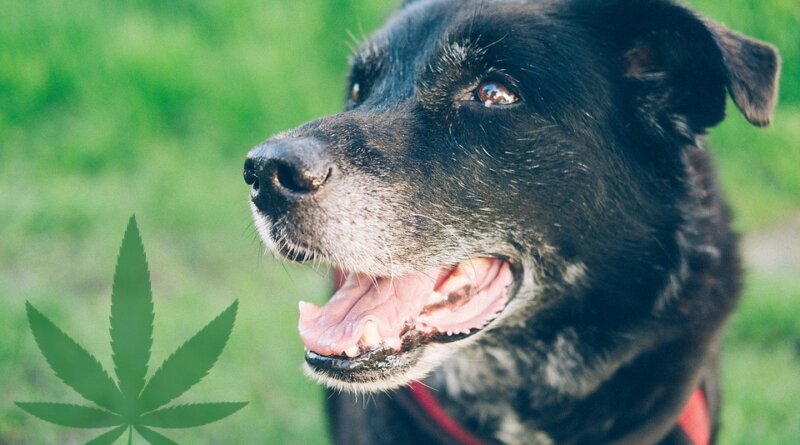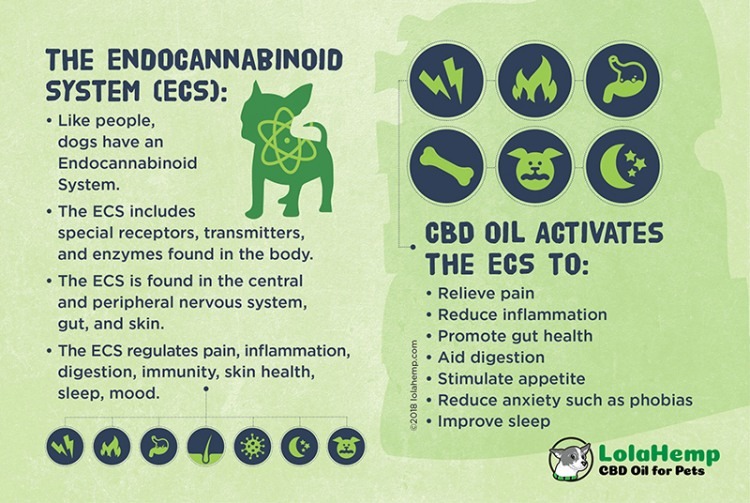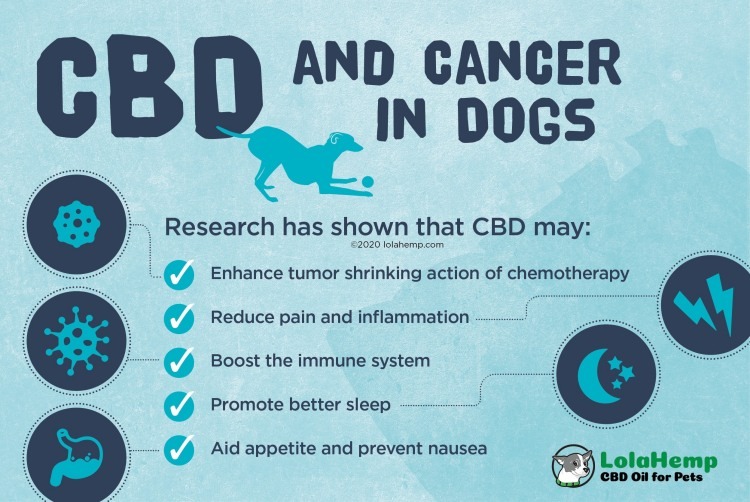CBD Oil for Dogs with Cancer: Possible Benefits and More
Let’s be absolutely clear: CBD oil alone is not a cure for cancer in dogs. We have seen some CBD manufacturers try to imply this, and quite frankly, we think it’s irresponsible.
It’s also unnecessary. The fact is that there are many research-backed ways that CBD oil may offer important support to a well-designed cancer-treatment plan for your canine companion. Support that might even make a difference in the efficacy of other treatments as well as in the overall quality of life for your pet during cancer treatment.
Although there is no known natural cancer cure for dogs, this article will direct you to the scientific research on CBD oil and various aspects of canine cancer treatments. Our hope is that you find enough information here that you can see for yourself and become an informed advocate for your pet’s best interests.
If you were looking for a well-researched guide to this natural remedy and cancer in dogs, you have found it!
CBD as Part of a Vet-Approved Cancer Treatment Plan
Depending on the type of cancer, as well as the stage of progression it is in, a veterinarian or veterinary oncologist (a vet with a specialization in cancer) may recommend a variety of treatment protocols. Surgery to remove tumors, chemotherapy to help shrink them and auxiliary medications to address the side effects of treatment are all common approaches. In some cases, vets will recommend natural supplements such as cannabidiol (CBD).
The point is that fighting cancer in dogs usually follows a multifaceted approach. And, there is research to support the notion that CBD oil may be beneficial to canine cancer patients as part of a veterinarian approved treatment plan in the following 5 ways:
1. CBD Supports Anti-Tumor Medication
A lot of people rightly balk when they hear about CBD and its potential to help reduce the size of tumors. It is one of those claims that just sounds way too good to be true. However, did you know this is actually a relatively well-researched topic?
In fact, CBD has been shown to have anti-tumor effects in several types of human cancers, including:
As this study explains, in addition to having its own tumor-shrinking properties, CBD may so effectively enhance the tumor-shrinking mechanisms of radiation therapy that it may be possible to decrease the dosing of this treatment without decreased efficacy, thereby reducing the harmful and sometimes severe side effects of this therapy.
Another recent study demonstrated that mice with pancreatic cancer who were treated with CBD in addition to gemcitabine (a type of chemotherapy) had a threefold increase in survival rate over treatment with gemcitabine alone!
As more and more research on the science of cancer emerges, what researchers are coming to realize is that the body’s endocannabinoid system (yes, your furry friend has one of those, too) is intimately related to cancer. That is, the parts of the central and peripheral nervous system’s complex signaling process related to the development of cancer actively respond to cannabinoids such as CBD.
2. Reduces Pain and Inflammation
Pain and inflammation can be side effects of treatment or symptoms of the progression of the disease itself. Pain management is almost always a part of how to treat cancer in dogs.
Unfortunately, many prescription pain medications have unwanted side effects. Opioid medications run the risk of ever-increasing tolerance and the potential for overdose. NSAIDs (non-steroidal anti-inflammatory drugs) have increasingly been scrutinized for their significant side effects in some canines, including serious GI problems, liver and kidney failure, and even death.
As researchers point out, the more severe negative side effects may be understudied and, in fact, pose more of a threat to senior and immune-compromised dogs.
Meanwhile, the ability of CBD to reduce both pain and inflammation is well documented. In addition, it may enhance the mechanisms of other classes of pain medications, allowing doctors to prescribe fewer or less of these drugs without compromising the comfort of the patient.
Furthermore, research has suggested a strong safety profile for CBD in humans and dogs, with fewer and less-severe side effects than other pain-management drugs commonly prescribed by veterinarians.
3. Boosts the Immune System
We now know that the endocannabinoid system and the immune system are closely linked. This relationship is so strong that some researchers have coined a term for these interrelated systems: the “immunocannabinoid system.”
Moreover, CBD in particular has been identified for its ability to reduce oxidative stress, an important process related to the body’s ability to fight off invading pathogens without further attacking and damaging healthy tissue.
In addition, cannabinoids can help regulate healthy gut function, which is also connected to immune health. We will explore this in more detail below.
4. Improves Sleep
Although research has shown that the endocannabinoid system plays a role in modulating sleep, the details as to what role each cannabinoid is playing are still being worked out. It is thought that THC and CBD, the two most prevalent cannabinoids found in cannabis (note that hemp strains contain only trace amounts of THC), work in opposite ways.
THC may act as a sleep agent, while CBD acts as a wake agent. This might not seem like it could help your suffering dog get a better night’s rest. However, research suggests that by promoting better “wake time” during the day, CBD oil may help with better sleep during the night cycle.
To be clear, this is an area of research that has had some mixed results in laboratory studies. In clinical practice, many veterinarians who use CBD as part of a complete cancer therapy may use a trial-and-error approach to find out if daytime, nighttime, or both works best to help their furry patients get a solid night’s sleep.
5. Helps with Nausea and Appetite
Unfortunately, the most common side effects of cancer treatment in dogs include problems maintaining a strong appetite and persistent nausea that can lead to anorexia. In addition, cancer-induced cachexia is a metabolic disorder that can be caused by several forms of cancer. It can also cause a severe loss of appetite and is the cause of as many as 20 percent of deaths among patients.
One of the reasons many oncologists are enthusiastic about the integration of cannabis-based medicine into a complete treatment program is the benefits various cannabinoids have for improving appetite and nausea.
In fact, it has been argued that the endocannabinoid system is deeply involved in regulating metabolism as well as overall gut health.
Believe it or not, the gut is jam-packed with endocannabinoid receptors, transmitters and enzymes. These systems help to maintain an environment favorable for the “good” gut flora as well as maintain a newly discovered “brain-gut” pathway thought to be critical to regulating a host of autonomic biological systems.
Talk to Your Vet about CBD for Dog Cancer
Although CBD oil is a natural product that is available over the counter without a prescription, it is still important to discuss using it with your vet. This is particularly important if your pooch is receiving other treatments or medications.
Cannabidiol does have known drug interactions. In some cases, this may mean you can use fewer medications, such as those prescribed for pain management. In other cases, your vet may recommended that you give cannabidiol at a different time than other medications to make sure this potent supplement won’t interfere with the actions of other drugs.
In some areas of the country, cannabis-based medicine for pets has received full-throated support from the veterinary community. For example, the California Veterinary Medical Association recently won their push for legislation that would protect veterinarians in the state who wish to discuss cannabis-based medication with their clients.
Not all veterinarians are receptive to research on the health benefits of CBD. If you are interested in finding a veterinarian more open to CBD oil as part of a treatment program for cancer in canines, look for a holistic veterinarian in your area and book a consultation. In addition, be sure to invest in a quality, full-spectrum CBD oil made just for pets, such as that offered at LolaHemp.
Remember, CBD oil is not a dog cancer cure. However, there are research-backed reasons to support the idea that it may be a value-added supplement to a well-rounded cancer treatment program.







how much is prednisone 10 mg https://prednisone.bid/ prednisone 50 mg tablet canada